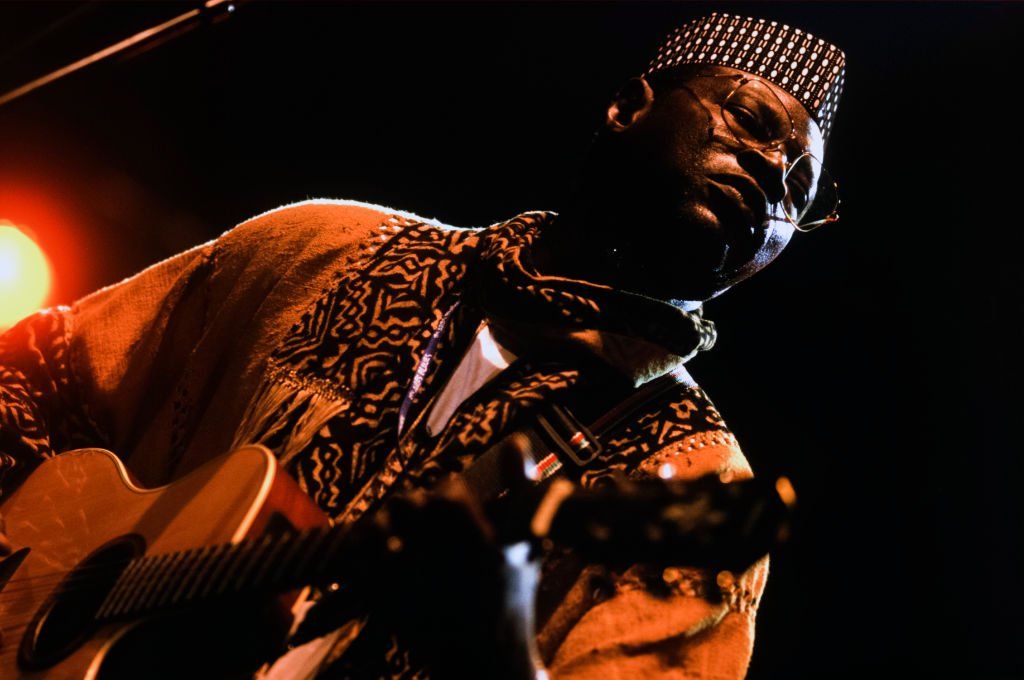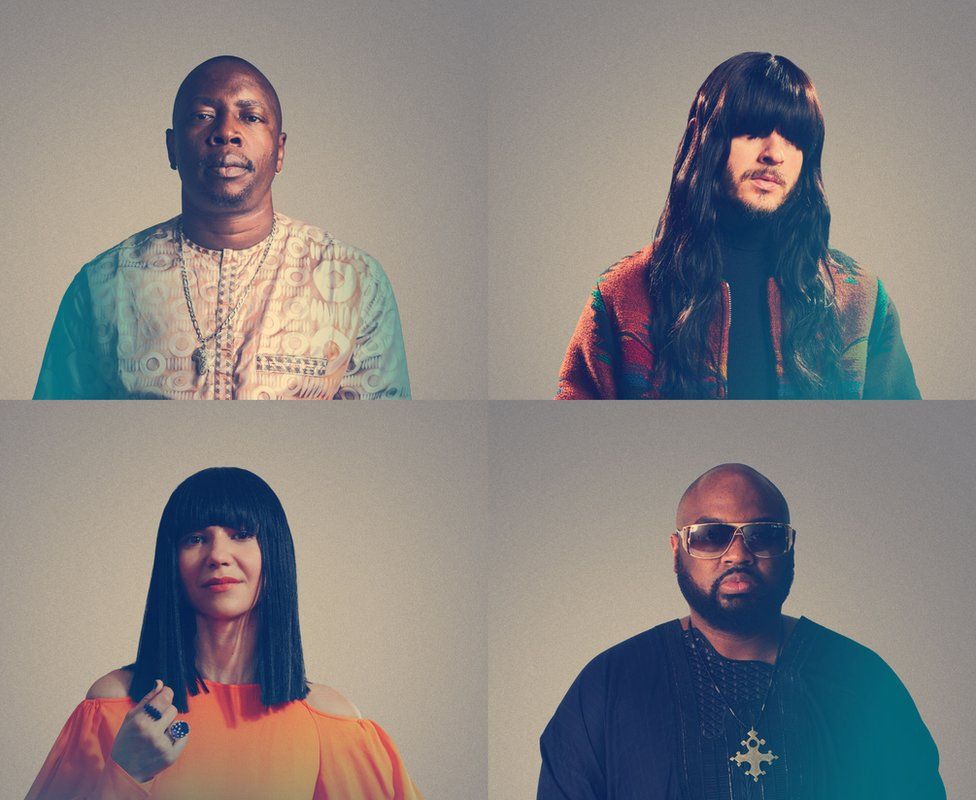Khruangbin update the music of Mali’s maestro
Whenever he was asked to state his profession, Malian musician Ali Farka Touré liked to respond that he was a farmer.
Known as the country’s greatest guitarist, he stepped away from music in 2000, retreating to his village in the semi-desert region of Niafunke to cultivate both his rice farm and his community. In 2004, he was elected mayor of Niafunke’s 53 villages and invested the majority of his music royalties into an irrigation scheme.
At home, he was considered a national hero. When he died in 2006, radio stations suspended their programming to play his music – a slow, loping version of the blues that drew on West African traditions as well as John Lee Hooker’s guitar riffs.
Western audiences knew him from his Grammy-winning collaborations with Ry Cooder and Toumani Diabaté.
Now, new listeners have the chance to discover his music thanks to a groundbreaking collaboration between his son Vieux and psychedelic Texan trio Khruangbin.
Vieux Farka Touré has inherited his father’s expressive, filigreed guitar phrasing; while Khruangbin are known for fusing elements of soul and blues with a globe-trotting blend of dub, Thai funk, cumbia and flamenco.
Together, they’ve concocted a striking and stylish tribute album that honours Ali’s music while spinning it off in unexpected new directions.
So, where did this other-worldly collaboration take shape? In a London pub, over a portion of fish and chips, as it turns out.
“It was my manager who suggested Khruangbin,” says Vieux. “I had not heard of them before this, to be honest.”
But after watching the band in concert, he was “deeply impressed” with their musical chops. The fish supper sealed the deal.
“I liked them very much as people and they were excited about the idea, so I said, ‘Great, let’s go!'”
Sessions took place in Khruangbin’s barn in rural Texas – not the plush, expensive conversion you’d expect, but an actual barn with a dirt floor and corrugated walls.
Vieux was only available for a week, so they cut the record live in back-to-back sessions that were simultaneously intense and utterly relaxed.
“Vieux was very jubilant,” says bassist Laura Lee Ochoa. “He just wanted play music and then he made us food – a giant fish and vegetables and rice. Huge servings of it.
“We would cut a few songs and then we would eat and then the day was over.”
No context
The songs on the album were hand-picked by Ali’s 11 children, spanning famous tracks like Diarabi, about a man whose girlfriend marries someone else because he can’t pay the dowry, to more obscure songs like Alakarra.
But Vieux never told the musicians in Khruangbin what they’d be playing before the tape started rolling.
“He didn’t give us any context,” says drummer Donald “DJ” Johnson. “He wanted us to come in with a fresh outlook, so we went in blind and recorded eight songs, with him teaching them to us, in a way.
“We didn’t even know the names of the songs until we were nearly finished with the project,” adds Ochoa.
“The working titles were ‘song one’, ‘song two’, ‘song three’, ‘song four’, for a very, very long time.
“Vieux wanted us to approach it with a blank slate and I think that was the right approach. Because as soon as you know what the original is, and the context of it, it’s so easy for your brain to either replicate it or try to do the opposite thing.”
Vieux says the sessions were informed by his father, who prioritised improvisation in the studio.
“My father said all the time, ‘We always have to give the best of ourselves.’ When I’m at the studio with a guitar in hand, his words go through my whole body, so it comes on its own. It’s a feeling that can’t really be explained.”

The fact that Vieux is making music at all is something of a miracle.
Ali Farka Touré discouraged his family from going into the business, having been scarred by ruthless concert promoters and label owners.
Instead, he advised Vieux to enter the military, where he could expect a regular payday. In defiance, his son practised guitar in secret by playing along to his father’s records. When he became an adult and declared his intentions, it caused a rift that took years to heal.
It was only at the end of Ali’s life, as he succumbed to cancer, that he gave Vieux his blessing – even recording a contribution for his son’s self-titled debut album shortly before he died.
Since then, Vieux has avoided his father’s legacy. He deliberately followed a distinct musical path, working with jazz great John Scofield and US rock star Dave Matthews on 2011’s The Secret, and recording two improvised albums with Israeli singer Idan Raichel.
Source of inspiration
“It’s difficult to be the child of someone who has gone to the top of the mountain,” he told Songlines in 2020. “I knew I had to establish my own identity. It was the only way people were going to listen and not just say, ‘He’ll never be as good as his father’.”
Having succeeded on his own merits, Vieux has been able to let go and allow his father’s influences to shine through. But that decision was also influenced by ongoing ethnic tensions and violence in Mali.
On his recent album Les Racines (The Roots), Vieux returned to the desert blues to emphasise its messages of unity and peace. On Ngala Kaourene, he made a spirited plea for ethnic reconciliation over a supple but urgent guitar line.
The Khruangbin collaboration, although recorded first, continues the theme. It opens pointedly with Savane, a song Ali recorded to protest against Western intervention in Mali’s domestic problems.
“Instead of giving us bombs, give us engines, so we can meet our own needs,” he sang.
“Savane is [from] the last album that my father made before his death, peace to his soul,” says Vieux. “I made it the first [track] of this album to pay tribute to him and show through the music that he is and remains my source of inspiration.”

For Khruangbin, however, the significance of Ali’s songs only came to light after recording sessions ended. In fact, they only learned the meaning of Savane when they started adding vocal overdubs and contacted Vieux to make sure their words didn’t subvert the original.
But that’s what gives the album its character. Unmoored from the weight of Ali’s history, Khruangbin followed their instincts – adding elements of zydeco and cajun music to those west African rhythms.
“Our intention always is to use music to bring people together,” says Ochoa. “And I think this album presented a unique opportunity for us to combine what we do with somebody from a different part of the world – and hopefully that will bring people together in a in a bigger way.”
“The album, for me, is really good, it’s heavy,” says Vieux. “It’s an album that we prepared with loving patience and an open mind for experimenting while also leaning on African culture, the source.
“It is different and new, but also familiar and universal.”
And what about that fish casserole that powered the sessions?
“I can’t give you the recipe, it’s top secret!” he laughs. “You will have to come to Mali, maybe then my mother will give you the magic recipe!”
Khruangbin and Vieux Farka Touré’s album, Ali, will be released on Friday 23 September.
- 6 December 2012












